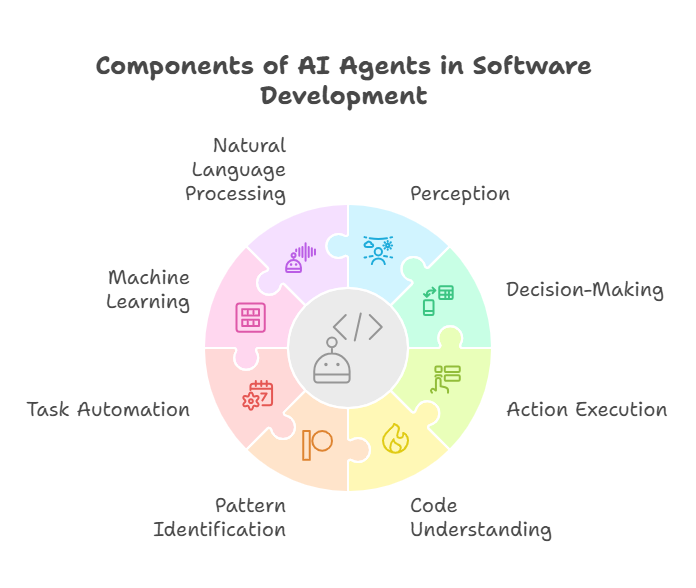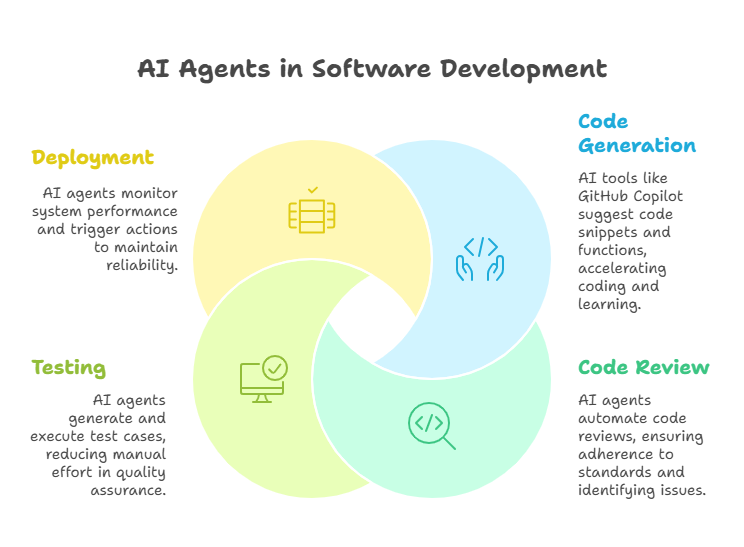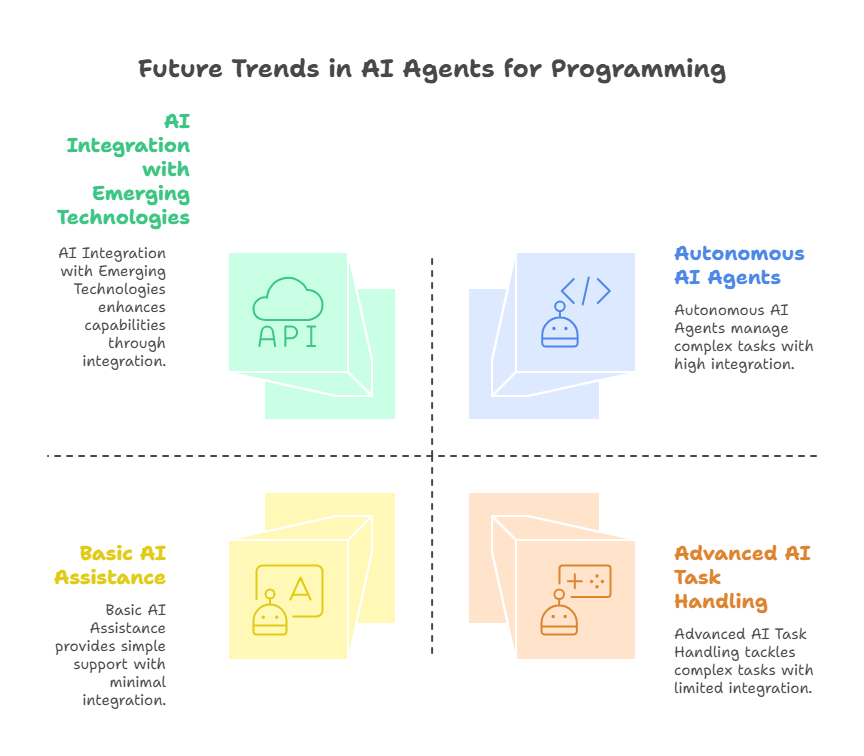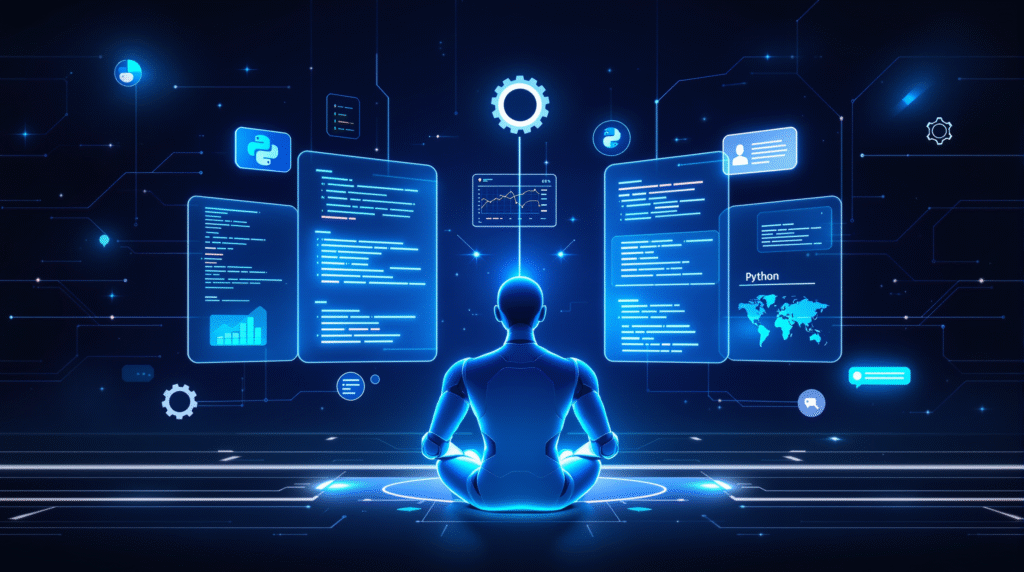Introduction: The Rise of AI Agents in Software Development
The world of software development is constantly evolving, with new tools and methodologies emerging to help developers write better code, faster. Among the most promising of these innovations are AI agents. These intelligent systems are poised to revolutionize how software is created, offering developers unprecedented levels of assistance and automation. As the complexity of software projects continues to grow, AI agents are becoming an indispensable asset for teams looking to stay competitive and efficient. This article explores the potential of AI agents, examining how they can enhance developer productivity and transform the future of programming.
What Are AI Agents?
AI agents are autonomous entities designed to perceive their environment, make decisions, and take actions to achieve specific goals. In the context of software development, these agents are equipped with the ability to understand code, identify patterns, and automate repetitive tasks. Unlike traditional tools that require explicit instructions, AI agents can learn from data and adapt to changing circumstances. They can assist with a wide range of activities, including code generation, debugging, testing, and project management. By leveraging machine learning and natural language processing, AI agents can understand complex requirements and provide intelligent solutions, making them a valuable addition to any development team.

How AI Agents Enhance Developer Productivity
AI agents are transforming the daily workflow of developers by automating routine tasks and providing intelligent support throughout the software development lifecycle. One of the most significant ways AI agents boost productivity is by automating code generation. Developers can describe the functionality they need in natural language, and the AI agent can generate boilerplate code or even complex algorithms, saving valuable time and reducing the risk of human error.
Another area where AI agents excel is in code review and debugging. By continuously analyzing codebases, AI agents can detect bugs, suggest optimizations, and highlight potential security vulnerabilities. This proactive assistance allows developers to focus on more creative and complex aspects of their work, rather than spending hours tracking down elusive bugs.
AI agents also streamline project management by automating task assignments, tracking progress, and predicting potential bottlenecks. They can integrate with popular development tools, providing real-time insights and recommendations that help teams stay on schedule and maintain high code quality. By handling repetitive and time-consuming tasks, AI agents free up developers to concentrate on innovation and problem-solving.
Real-World Use Cases: AI Agents in Action
The impact of AI agents is already visible in many real-world software development environments. For example, GitHub Copilot, powered by OpenAI, acts as an AI pair programmer, suggesting code snippets and entire functions as developers type. This not only accelerates coding but also helps developers learn new frameworks and languages on the fly.
In large organizations, AI agents are used to automate code reviews and enforce coding standards across distributed teams. Tools like DeepCode and Amazon CodeGuru analyze codebases for bugs, security issues, and performance bottlenecks, providing actionable feedback within minutes. This leads to faster release cycles and higher-quality software.
AI agents are also making strides in testing and deployment. Automated testing agents can generate test cases, execute them, and report results, significantly reducing the manual effort required for quality assurance. In DevOps, AI agents monitor system performance, predict outages, and even trigger automated rollbacks or scaling actions to maintain system reliability.
These examples demonstrate that AI agents are not just theoretical concepts but practical tools that are already reshaping the way software is developed, tested, and maintained. As their capabilities continue to grow, their role in enhancing developer efficiency will only become more prominent.

Integrating AI Agents into Your Workflow
Integrating AI agents into your development workflow requires a strategic approach to maximize their benefits. Start by identifying the most time-consuming and repetitive tasks that could be automated or augmented by AI. This might include code generation, testing, debugging, or project management.
Next, evaluate the available AI agent tools and platforms to find the best fit for your team’s needs. Consider factors such as the agent’s capabilities, integration with existing tools, ease of use, and cost. Begin with a pilot project to test the AI agent in a controlled environment and gather feedback from developers.
Provide training and support to help developers learn how to effectively use the AI agent. Encourage experimentation and collaboration to discover new ways to leverage the agent’s capabilities. Establish clear guidelines and best practices for using AI agents to ensure consistency and maintain code quality.
Continuously monitor the performance of AI agents and adjust your workflow as needed. Track metrics such as code generation speed, bug detection rate, and project completion time to measure the impact of AI agents on developer productivity. Regularly review and update your AI agent strategy to adapt to evolving technologies and changing project requirements.
Challenges and Limitations of AI Agents
While AI agents offer numerous benefits, they also come with certain challenges and limitations that developers should be aware of. One of the primary concerns is the potential for AI agents to generate incorrect or suboptimal code. Developers must carefully review and validate the code produced by AI agents to ensure it meets the required standards and specifications.
Another challenge is the risk of over-reliance on AI agents, which can lead to a decline in developers’ critical thinking and problem-solving skills. It’s important to strike a balance between automation and human expertise, ensuring that developers remain engaged and actively involved in the development process.
AI agents may also struggle with complex or novel tasks that require creativity and intuition. In these cases, human developers are still essential for providing innovative solutions and making strategic decisions. Additionally, there are ethical considerations surrounding the use of AI agents, such as the potential for bias in code generation and the impact on job displacement.
Addressing these challenges requires a thoughtful and responsible approach to integrating AI agents into the development workflow. By understanding their limitations and focusing on collaboration between humans and AI, developers can harness the full potential of AI agents while mitigating the risks.
Best Practices for Working with AI Agents
To maximize the benefits of AI agents and mitigate potential risks, it’s essential to follow some best practices. First, prioritize code quality by always reviewing and testing the code generated by AI agents. Use static analysis tools and automated testing frameworks to ensure that the code meets the required standards and specifications.
Second, foster collaboration between humans and AI by encouraging developers to actively participate in the development process. Use AI agents as a tool to augment human capabilities, rather than replace them entirely. Encourage developers to provide feedback on the performance of AI agents and suggest improvements.
Third, establish clear guidelines and coding standards for using AI agents. Define the types of tasks that are best suited for AI automation and the level of human oversight required. Ensure that all developers are trained on how to use AI agents effectively and responsibly.
Fourth, continuously monitor the performance of AI agents and track key metrics such as code generation speed, bug detection rate, and project completion time. Use this data to identify areas for improvement and optimize your AI agent strategy. Regularly review and update your AI agent strategy to adapt to evolving technologies and changing project requirements.
The Future of AI Agents in Programming
The future of AI agents in programming is bright, with ongoing advancements in machine learning and natural language processing promising even greater capabilities. In the coming years, we can expect AI agents to become more sophisticated, capable of handling increasingly complex tasks and providing more personalized assistance to developers.
One trend to watch is the rise of autonomous AI agents that can independently manage entire software projects, from requirements gathering to deployment and maintenance. These agents will be able to learn from experience, adapt to changing circumstances, and make strategic decisions without human intervention.
Another trend is the integration of AI agents with other emerging technologies, such as cloud computing, edge computing, and the Internet of Things (IoT). This will enable AI agents to analyze vast amounts of data in real-time and provide intelligent insights that drive innovation and improve decision-making.
As AI agents become more prevalent, they will transform the role of developers, shifting the focus from coding to higher-level tasks such as design, architecture, and strategy. Developers will need to develop new skills in areas such as AI ethics, data analysis, and human-computer interaction to effectively collaborate with AI agents and leverage their full potential.

Conclusion: Embracing the AI-Driven Developer Era
AI agents are rapidly transforming the landscape of software development, offering developers unprecedented opportunities to enhance their productivity, improve code quality, and accelerate innovation. By automating routine tasks, providing intelligent support, and fostering collaboration between humans and AI, these agents are paving the way for a new era of AI-driven development.
While there are challenges and limitations to consider, the benefits of AI agents far outweigh the risks. By following best practices, establishing clear guidelines, and continuously monitoring performance, developers can harness the full potential of AI agents and unlock new levels of efficiency and creativity.
As AI technology continues to evolve, the role of developers will also change, shifting the focus from coding to higher-level tasks such as design, architecture, and strategy. Developers who embrace AI agents and develop the skills needed to collaborate effectively with them will be well-positioned to thrive in the future of programming.
In conclusion, AI agents are not just a passing trend but a fundamental shift in the way software is developed. By embracing this technology and adapting to the changing landscape, developers can unlock new levels of productivity, innovation, and success in the AI-driven developer era.
Python Code Example: Building a Simple AI Agent
Here’s a practical Python example demonstrating how to create a basic AI agent for code analysis and suggestion:
python
import ast
import re
from typing import List, Dict, Any
class CodeAnalysisAgent:
"""
A simple AI agent for analyzing Python code and providing suggestions.
"""
def __init__(self):
self.suggestions = []
self.code_patterns = {
'long_functions': r'def\s+\w+\([^)]*\):(?:[^d]|d(?!ef))*?(?=def|\Z)',
'magic_numbers': r'\b(?<![\w.])\d{2,}\b(?![\w.])',
'todo_comments': r'#\s*TODO:.*',
}
def analyze_code(self, code: str) -> Dict[str, Any]:
"""
Analyze Python code and return suggestions for improvement.
"""
self.suggestions = []
# Parse the code into an AST
try:
tree = ast.parse(code)
except SyntaxError as e:
return {"error": f"Syntax error: {e}"}
# Analyze different aspects of the code
self._check_function_length(code)
self._check_magic_numbers(code)
self._check_todo_comments(code)
self._check_naming_conventions(tree)
return {
"suggestions": self.suggestions,
"total_issues": len(self.suggestions),
"code_quality_score": max(0, 100 - len(self.suggestions) * 10)
}
def _check_function_length(self, code: str):
"""Check for overly long functions."""
functions = re.findall(self.code_patterns['long_functions'], code, re.DOTALL)
for func in functions:
lines = func.strip().split('\n')
if len(lines) > 20:
self.suggestions.append({
"type": "refactoring",
"message": "Consider breaking down long functions (>20 lines)",
"severity": "medium"
})
def _check_magic_numbers(self, code: str):
"""Check for magic numbers in the code."""
magic_numbers = re.findall(self.code_patterns['magic_numbers'], code)
if magic_numbers:
self.suggestions.append({
"type": "best_practice",
"message": f"Consider using named constants instead of magic numbers: {', '.join(set(magic_numbers))}",
"severity": "low"
})
def _check_todo_comments(self, code: str):
"""Check for TODO comments."""
todos = re.findall(self.code_patterns['todo_comments'], code)
if todos:
self.suggestions.append({
"type": "maintenance",
"message": f"Found {len(todos)} TODO comment(s) that need attention",
"severity": "low"
})
def _check_naming_conventions(self, tree: ast.AST):
"""Check for proper naming conventions."""
for node in ast.walk(tree):
if isinstance(node, ast.FunctionDef):
if not re.match(r'^[a-z_][a-z0-9_]*$', node.name):
self.suggestions.append({
"type": "style",
"message": f"Function '{node.name}' should use snake_case naming",
"severity": "low"
})
def generate_improved_code(self, code: str) -> str:
"""
Generate improved version of the code based on analysis.
"""
# Simple example: add docstrings to functions without them
lines = code.split('\n')
improved_lines = []
for i, line in enumerate(lines):
improved_lines.append(line)
if line.strip().startswith('def ') and line.strip().endswith(':'):
# Check if next line is already a docstring
if i + 1 < len(lines) and not lines[i + 1].strip().startswith('"""'):
improved_lines.append(' """Add function description here."""')
return '\n'.join(improved_lines)
# Example usage
if __name__ == "__main__":
# Sample code to analyze
sample_code = '''
def calculate_total(items):
total = 0
for item in items:
if item > 100:
total += item * 0.9
else:
total += item
return total
def process_data():
# TODO: Implement data processing logic
data = [1, 2, 3, 150, 200, 75]
result = calculate_total(data)
return result
'''
# Create and use the AI agent
agent = CodeAnalysisAgent()
analysis = agent.analyze_code(sample_code)
print("=== Code Analysis Results ===")
print(f"Code Quality Score: {analysis['code_quality_score']}/100")
print(f"Total Issues Found: {analysis['total_issues']}")
print("\nSuggestions:")
for suggestion in analysis['suggestions']:
print(f"- [{suggestion['severity'].upper()}] {suggestion['message']}")
print("\n=== Improved Code ===")
improved_code = agent.generate_improved_code(sample_code)
print(improved_code)This Python example demonstrates a basic AI agent that can analyze code, identify potential issues, and suggest improvements. The agent showcases key concepts like pattern recognition, code parsing, and automated suggestions that are fundamental to more sophisticated AI development tools.
Quantum Programming with AI Agents: New Horizons in Computing
AI Agents in Practice: Automating a Programmer’s Daily Tasks
Artificial Intelligence in Practice: How to Deploy AI Models in Real-World Projects


